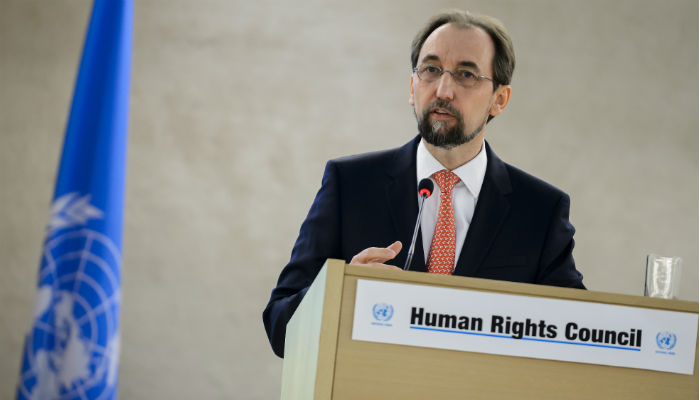UN High Commissioner for Human Rights Zeid Ra’ad Al Hussein has voiced concerns about the deteriorating human rights situation in Turkey, saying that measures taken under emergency rule in the country target criticism, not terrorism.
A state of emergency was declared in Turkey in the aftermath of a failed coup attempt on July 15.
Releasing his Annual Report and Oral Update to the 34th session of the UN Human Rights Council on Wednesday as he informed members of the council on various issues around the world, Al Hussein said: “In Turkey, bombs and other shocking terrorist attacks against civilians continue to claim lives, which I condemn, and I fully understand the authorities are operating in a challenging environment in many respects. However, I am concerned measures taken under the state of emergency appear to target criticism, not terrorism. The fact that tens of thousands of people have been dismissed, arrested, detained or prosecuted following the attempted coup – including numerous democratically elected representatives, judges and journalists – raises serious alarm about due process guarantees being met. ”
The failed military coup attempt on July 15 killed over 240 people and wounded more than a thousand others. Immediately after the putsch, the Justice and Development Party (AKP) government along with President Recep Tayyip Erdoğan pinned the blame on the Gülen movement despite the lack of any evidence to that effect.
Although the Gülen movement strongly denies having any role in the putsch, the government accuses it of having masterminded the foiled coup. Fethullah Gülen, who inspired the movement, called for an international investigation into the coup attempt, but President Erdoğan — calling the coup attempt “a gift from God” — and the government initiated a widespread purge aimed at cleansing sympathizers of the movement from within state institutions, dehumanizing its popular figures and putting them in custody.
In the currently ongoing post-coup purge, over 135,000 people, including thousands within the military, have been purged due to their real or alleged connection to the Gülen movement, according to a statement by the labor minister on Jan. 10. As of March 1, 93,248 people were being held without charge, with an additional 46,274 in pre-trial detention.
Al Hussein also said it will be particularly crucial for the credibility of April’s referendum on amending the Constitution that space for open debate, free of intimidation, be guaranteed.
Turkey will hold a referendum on April 16 which will introduce an executive presidency in Turkey.
Also dwelling on the human rights situation in Turkey’s southeast, Al Hussein said the situation in the region remains deeply troubling.
“Without access to the area, the remote monitoring procedure engaged by my Office has established credible indications of hundreds of deaths, suggesting disproportionate security measures in response to violent attacks,” said the UN official.
Acts of violence rapidly increased and a settlement process between the Turkish government and the outlawed Kurdistan Workers’ Party (PKK) came to an end in the summer of 2015. Hundreds of civilians, soldiers and police officers have been killed in terror attacks perpetrated by the PKK since then.



